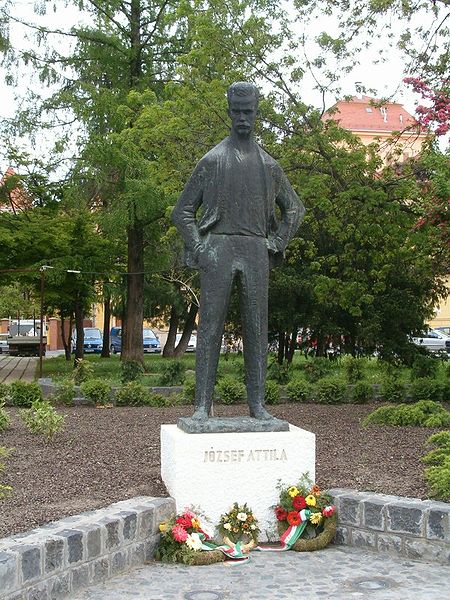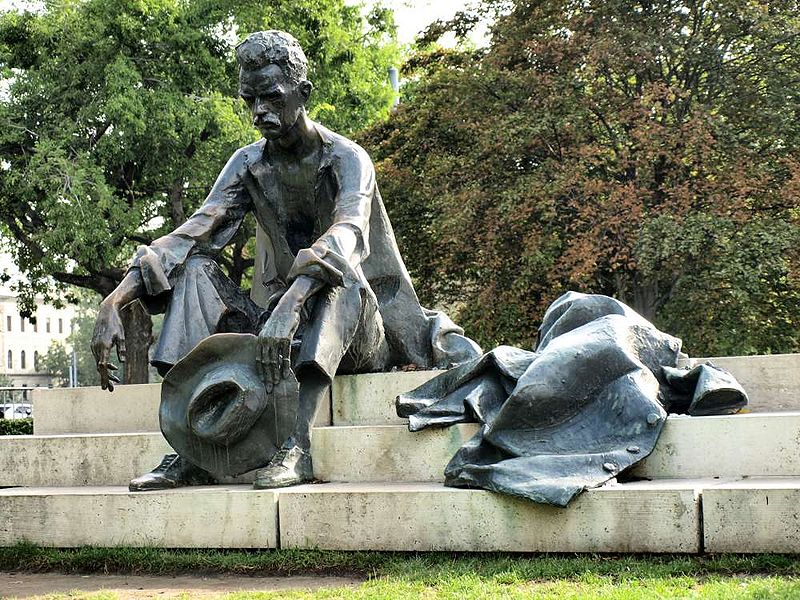<Back to Index>
- Physicist Macedonio Melloni, 1798
- Poet Attila József, 1905
- President of the Portuguese Republic António Sebastião Ribeiro de Spínola, 1910
PAGE SPONSOR


Attila József (11 April 1905 – 3 December 1937) was one of the most important and well known Hungarian poets of the 20th century.
The son of Áron József, a soap factory worker of Romanian origin, and Hungarian peasant girl Borbála Pőcze, he was born in Ferencváros, a poor district of Budapest. He had two elder sisters: Eta and Jolán. His father abandoned the family when he was just three years old. They lived in extreme poverty: the mother could barely support the three children and pay rent for the tiny flat they were living in. Thus the children were cared for by the National Child Protection League and foster parents in the country town of Öcsöd, where he worked on a farm. It was typical of the conditions there that his foster father said "There is no such name as 'Attila'", and therefore called him 'Pista'. The conditions were so bad that he escaped back to his mother in Budapest.
His mother died in 1919, aged only 43. After this, he was looked after by Ödön Makai, his brother-in-law, who was relatively wealthy and could pay for his education in a good secondary school. Later he applied to the University of Szeged – his dream was to become a secondary school teacher – but he was soon expelled when a man named Antal Horger determined he was unfit for teaching because of a provocative poem he had written (With All My Heart).
From this point on, he tried to support himself from the little money he earned by publishing his poems. He started showing signs of schizophrenia, and was treated by psychiatrists (now he probably would be diagnosed with borderline personality disorder). He never married and only had a small number of affairs, but frequently fell in love with the women who were treating him.
He died on 3 December 1937, aged 32, at Balatonszárszó, where he was staying at the house of his sister and brother-in-law. Crawling through the railway tracks, he was crushed by a starting train. There is a memorial to him not far from the spot where he died. The most widely accepted view is that he committed suicide, but some experts say that his death was by accident.
Attila
József is the best known of the modern Hungarian poets
internationally. His poems have been translated into many languages and
he is taught in world literature classes around the globe. Hailed
during the communist era of the 1950s as Hungary's great "proletarian poet", his life, personality, and works are now being re-evaluated with the current celebrations of the centenary of his birth. His first volume of poetry was A szépség koldusa (1922); at that time he was 17 and still in school. József studied privately for a year, and then entered the University of Szeged in 1924 to study Hungarian and French literature. With the help of a maecenas, Lajos Hatvany, he acquired a good education in Austria (1925) and Paris (1926 – 27), where he studied French literature and discovered the work of François Villon, the famous poet and thief from the 15th century. In 1925 József published his second collection of poems, Nem én kiáltok. He was expelled from the university because of a revolutionary poem, Tiszta szívvel. With his manuscripts he traveled to Vienna, where he made a living by selling newspapers and cleaning dormitories, and then to Paris, where he studied at the Sorbonne. During this period he read Hegel and Karl Marx, whose call for revolution appealed to him. József's works were praised by such internationally known Hungarian researchers and critics as Béla Balázs and György Lukács. In 1927 several French magazines published József's poems. József's third collection of poems, Nincsen apám se anyám (1929), showed the influence of French surrealism and Hungarian poets Endre Ady, Gyula Juhász and Lajos Kassák. The next year József joined the illegal Communist Party of Hungary (KMP). Döntsd a tőkét (1931) was confiscated by the public prosecutor and in 1931 József's essay Literature and Socialism (Irodalom és szocializmus) led to indictment. However, not long afterward, he left the Communist Party. Külvárosi éj, a mature collection of poems appeared in 1932. His most famous love poem, Óda, from 1933 took the reader for a journey around and inside the body of the beloved woman. József's last two books were Medvetánc (1934) and Nagyon fáj (1936). With these works he gained a wide critical attention. Ideologically he
had started to advocate humane socialism and alliance with all
democratic forces. Only a few are aware of the fact that it was Attila
József who first formulated the ars poetica of transrealism in his 1937 poem Welcome to Thomas Mann. József's political essays were later included in Volume 3. of his Collected Works (1958).